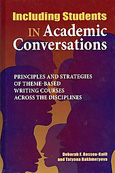College Writing Program Faculty
M.S. in Education, State University of Geneseo
Doctoral Candidate in Teaching and Curriculum, University of Rochester
(585) 273-3577, Morey 200 suite
Liz Tinelli teaches writing and ESOL courses at the University of Rochester and literacy theory courses at the Warner School of Education. Her research investigates students’ home and school literacy practices and explores the intersection of these practices in the composing process. Her early research work examined the ways in which teachers’ pedagogical practices influenced student learning and participation. More recently, she has investigated the ways in which writing processes, such as peer review and revision, can be positioned as meaningful social practices for student learning in writing.
Selected publications
-
Luehmann, A. & Tinelli, L. (In press). Supporting practicing science teachers’ growth: The case of blogging in an action research seminar. In A. Luehmann & R. Borassi (Eds.), Blogging as Change: Transforming Education Through New Media Literacies. New York: Peter Lang Publishing.
-
Luehmann, A. & Tinelli, L. (2008). Teacher professional identity development with social networking technologies: Learning reform through blogging. Educational Media International 45(4), 323-333.
Teaching Interests:
Writing, Literacy theory, Pedagogy
Courses at Rochester
-
Literacy Learning as Social Practice, EDU 498
-
Reasoning and Writing in the College, WRT 105/WRT 105E
-
Workshop in Writing, WRT 108
Selected Honors, Fellowships, and Professional Activities
-
Breadth Fellowship. Reasoning and Writing in the College. 2009-2011
-
College Teaching, Learning and Technology Roundtable Grant. Utilizing Collaborative Technologies to Support Student Learning in Writing. 2010-2011
-
Reviewer for Educational Researcher
B.A. (English and Dance), Skidmore College
M.A. (English), University of Rochester
Doctoral Candidate in English, University of Rochester
(585) 273-2481, Rush Rhees Library G-121
Stefanie Sydelnik serves as the Assistant Director of the College Writing Program at the University of Rochester. In this position Stefanie teaches writing and pedagogy courses, manages the College Writing Center, and shares information about the writing center with the greater university community. Her dissertation research focuses on nineteenth-century American literature, particularly the use of fictional narrative and poetry in antislavery reform campaigns. She has worked in the College Writing Program since 2004, teaching, tutoring, and coordinating writing center services. This experience shaped her professional interest in writing center theory and practice, composition pedagogy, and writing program administration. Her current research focuses on examining writing center evaluation tools with the goal of increasing students’ voices in writing center assessment.
Teaching Interests:
Writing, Pedagogy, American Literature
Courses at Rochester
-
Reasoning and Writing in the College, WRT105 (American Dreams and Dangerous Words: Censorship Debates in American Culture)
- Workshop in Writing, WRT 108
- Practicum in the Teaching of Writing, WRT 572/ENG 572
Selected Honors, Fellowships, and Professional Activities
- Edward Peck Curtis Award for Excellence in Teaching by a Graduate Student, University of Rochester, 2007
- Dean’s Co-Teaching Fellowship, University of Rochester, 2007
- Miranda Warner Award for Exemplary Literary Criticism Focused on Women’s Issues, Skidmore College, 2003
- Vice President for Publications, Charlotte Perkins Gilman Society

B.S. (Biochemistry), University of Illinois
Ph.D. (Biological Sciences), Carnegie-Mellon University
Postdoctoral Studies (Immunology), Harvard University, U. Massachusetts, Boston Medical Center
Rush Rhees Library G-121
Katherine Schaefer teaches argumentative writing and writing in the scientific and medical disciplines at the University of Rochester. In addition, Schaefer serves as the administrative head of the Writing Module program that integrates workshops about writing principles into discipline-specific classes. Her approach to teaching scientific/technical writing is informed both by the pedagogical literature in Composition and by more than 20 years of research experience in the Biological Sciences. Dr. Schaefer remains involved in writing about inflammatory bowel disease and colon cancer research. Current research interests include (1) investigating how previous experience with writing instruction affects the process of writing development during the college years and (2) developing and assessing science writing assignments that have realistic, authentic purposes and that demonstrate the interplay between thinking and writing when doing science.
Selected publications
-
Naydenov NG, Brown B, Harris G, Schaefer KL, Fisher PB, and Ivanov, AI (2011). Loss of aSNAP induces epithelial cell apoptosis via downregulation of BCL-2 expression and disruption of the Golgi. Manuscript under review
-
Zhang L, Sun W, Wang J, Zhang M, Yang S, Tian Y, Vidyasagar S, Pena L, Zhang K, Cao Y, Yin L, Wang W, Zhang L, Schaefer KL, Saubermann LJ, Swarts SG, Fenton BM, Keng PC, and Okunieff P. Mitigation Effect of an FGF-2 Peptide on Acute Gastrointestinal Syndrome after High-Dose Ionizing Radiation (2010). Int J Radiat Oncol Biol Phys 77: 261-8.
-
Harris G, Schaefer KL. The microtubule-targeting agent T0070907 induces proteasomal degradation of tubulin (2009). Biochem Biophys Res Commun 388:345-9.
-
Schaefer KL. PPARγ inhibitors as novel tubulin-targeting agents (2008). PPAR Research 2008: 785405 (epub).
-
Schaefer, KL. PPARγ inhibitors as novel tubulin-targeting agents (2007). Expert Opin. Investig. Drugs 16: 923-6.
-
Takahashi H, Morales VM, Harris G, Barton S, Osawa E, Nakajima A, and Saubermann LJ. PPARγ inhibitors reduce tubulin protein levels by a PPARgamma, PPARdelta, and proteasome-independent mechanism, resulting in cell cycle arrest, apoptosis and reduced metastasis of colorectal carcinoma cells (2007). Int. J. Cancer 120:702-13.
-
Schaefer KL, Wada K, Takahashi H, Matsuhashi N, Ohnishi S, Wolfe MM, Turner JR, Nakajima A, Borkan SC, and Saubermann LJ. Peroxisome proliferator-activated receptor γ inhibition prevents adhesion to the extracellular matrix and induces anoikis in hepatocellular carcinoma cells (2005). Cancer Res. 65:2251-9.
-
Schaefer KL, Ma C, Denevich S, Cooley SR, Schlezinger J, Sherr D and Saubermann, LJ. Intestinal antiinflammatory effects of thiazolidenedione peroxisome proliferator-activated receptor-gamma ligands on T helper type 1 chemokine regulation include nontranscriptional control mechanisms (2005). Inflamm Bowel Dis. 11(3):244-52.
-
Schaefer KL, and McClure WR. (1997) Antisense RNA control of gene expression in bacteriophage P22. I. Structures of sar RNA and its target, ant mRNA. RNA 3: 141-156.
-
Schaefer KL, and McClure WR. (1997) Antisense RNA control of gene expression in bacteriophage P22. II. Kinetic mechanism and cation specificity of the pairing reaction. RNA 3: 157-174.
Teaching Interests:
Writing in the Scientific and Medical Disciplines
Courses at Rochester
-
Reasoning in the College, WRT105 (Disease and Society)
-
Topics in Drug Development, BIO271/WRT271
-
Developing a Professional Biology Writing Portfolio, BIO272/WRT272
Selected Honors, Fellowships, and Professional Activities
- Invited Reviews: PPAR Research and Expert Opinion on Investigational Drugs
- College Teaching and Learning Technology Roundtable Grant, 2011
- Clinical Translational Science Institute Pilot Grant, 2007
- NRSA postdoctoral training grant, 2004
- Society of Mucosal Immunology, 2005
- American Association of Cancer Researchers, 2006
- Member, Steering Committee, Alternative Dispute Resolution at University of Rochester
- Freshman Advisor, University of Rochester
Fellowships:
Memberships requiring election:
Professional Activities:

M.F.A. University of Michigan
Ph.D. University of Minnesota
Writing Studies, Dialogue Studies
(585) 273-3583, Rush Rhees Library G-120
Deborah Rossen-Knill studies real and fictional texts, drawing on work in linguistics, philosophy of language, cognitive science, composition, and literary studies. Her early research focuses on describing and explaining dialogue in fiction, verbal parody, and interactions around yes-no questions in natural language. More recently, she has brought knowledge from linguistics and dialogue studies to her interest in writing program administration and writing instruction. Her work in these areas focuses on the function of student input in writing placement conversations, the identification of dialogically-based principles of academic writing and corresponding teaching strategies, and rhetorical grammar.

Selected publications
- Rossen-Knill, Deborah. "Flow and the Principle of Relevance: Bringing Our Dynamic Speaking Knowledge to Writing." Journal of Teaching Writing (in press).
- Rossen-Knill, Deborah and Tanya Bakhmetyeva. Including Students in Academic Conversations: Principles and Strategies for teaching Theme-Based Writing Courses across the Disciplines. New York: Hampton, 2011.
- Rossen-Knill, Deborah “Arthur & George: Analyzing The Power of Language through the Principle of Relevance.” Language and Literature 20.1 (2011): 43-58.
- Principle of Relevance.” Language and Literature 20.1 (2011): 43-58.
- Bedore, Pam and Deborah Rossen-Knill, “Informed Self-Placement: Is a Choice Offered a Choice
Received?” WPA: Journal of the Council of Writing Program Administrators, Fall (2004):
55-78.
- Rossen-Knill, Deborah and Kim Lynch. “A Method for Describing Basic Writers and Their Writing:
Lessons from a Pilot Study.” Journal of Basic Writing 19.2 (2000): 93-123.
- Rossen-Knill, Deborah. “Creating and Manipulating Fictional Worlds: A Taxonomy of Dialogue in Fiction.” Journal of Literary Semantics. XXVIII/1 (1999): 20-45.
- Rossen-Knill, Deborah, and Richard Henry. "The Pragmatics of Verbal Parody." Journal of Pragmatics 27(1997): 719-759.
- Rossen-Knill, Deborah. "A Pragmatics for Literary Interpretation." Poetics: Journal for Empirical Research on Literature, The Media and The Arts 22 (1994): 423-445.
Teaching Interests:
Writing, pedagogy, rhetorical grammar
Courses at Rochester
- Advanced Writing and Peer Tutoring, WRT 245/ENG 285
- Studies in grammar, writing, and tutoring (group independent study)
- Writing Pedagogy, WRT 571/ENG 571 Practicum in the Teaching of Writing, WRT 572/ENG 572
Selected Honors, Fellowships, and Professional Activities
- College Teaching and Learning Technology Roundtable Grant, Co-Investigator Ted Pawlicki, 2010
- The Goergen Award for Curricular Achievement in Undergraduate Education: Program Award to the College Writing Program
- Chair, Special Interest Group on Language, Linguistics, and Writing. Conference on College Composition and Communication, 2009-2011
